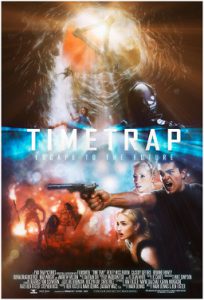This is mark Joseph “young” blog entry #330, on the subject of Temporal Notes on an Episode of “The Orville”.
A long-time early fan of Temporal Anomalies in Time Travel Movies (and contributor of Temporal Anomalies in Time Travel Movies Unravels The Final Countdown) contacted me via Facebook Messenger to ask a question about a particular two-episode time travel story arc of a television show. I have made it clear that I don’t do analyses of television series, but given that this was one question about one episode of one series, and I was probably going to have to answer him in a post that would have been too long for that medium, and I have been neglecting my time travel audience to some degree, I decided to bring it over here.

We will begin with his post, with minimal edits marked:
Have you watched the tv show The Orville? It’s sort of a self-aware knock off of Star Trek. They’ve had at least a dozen Star Trek actors in cameo roles in the first two seasons. Anyway, there’s a time travel story. I’m going to try to present it to you with as few spoilers as possible, in case you’ve not seen the show.
So, in one episode, the ship hits a temporal anomaly in space which causes the seven-years younger version of the ship’s first officer to be sent forward in time to land on The Orville. Episode proceeds, she’s eventually given an unsuccessful memory wipe and sent back in time. They attempted to wipe her memory so that she could not affect the future. But it didn’t take. So she changes history such that The Borg have conquered The Federation. (Not exactly, that’s the spoiler-free version of the story[.])
Next episode, seven years later. The Borg have conquered The Federation. She remembers that time trip and realizes that it was her tampering that caused it. So she rounds up everyone from The Orville. This time, they send back the doctor (A Star Trek DS9 Alum) to do the memory wipe correctly. Timeline restored.
Under your theory, once she travels into the future, the future self no longer exists, correct? It would be as if they went to New Jersey for seven years, only they didn’t age. So there can’t be two of them in the future. (That’s not a spoiler, You’d have seen it coming[.])
What about her knowledge? There’s no reason to think the younger version wouldn’t always be sent into the future. And there’s no reason to think the memory wipe wouldn’t take. So the last problem is the doctor going back to redo it. Anomalies you can see?
But the lady was questioning that. “If she’s younger me, then why don’t I remember any of this?” And eventually concludes that she doesn’t remember it because the memory wipe must have been successful. No reason to think she wouldn’t still think that.
Based on what I’ve said, what are your thoughts? I think it resolves, except for the first officer being there. What difference does that make? I’m not 100% I agree with your theory there. If she eventually will go back in time, why wouldn’t two of them be there? But anyway.
Thoughts?
So that is the question.
First, my wife and I enjoyed the first season of The Orville when FoxNOW was a free service on our Roku television. When they went to a subscription service, well, it didn’t seem worth the money to subscribe for the sake of only one show we were at all likely to watch, and a good but not great one in our assessment, so it was forgotten. The time travel arc was not included in what we watched.
The statement that the older version of the first officer would not be in the future is partly correct, but it’s more complicated than that.
One of the problems we have is a problem with the fact that this is a television series. I am assuming that the event which moved the first officer to the future occurred prior to season one episode one. That would mean that she never boarded The Orville, and thus all of the episodes we have watched are wrong. The older version of herself is not there because she never was there; someone else is first officer, and all the espisodes to date have to be re-imagined to include this other officer. Our time traveler will not, in this original history, meet herself, but will find that she has no history for seven years.
There would be no problem if they simply found a place in their time for this traveler from the past, as Starfleet did for Dr. Gillian in Star Trek IV: The Voyage Home. The trouble begins because they decide to send her back, and once you send anything into the past, you alter the past and create an anomaly. Remember, no one even imagines that this time traveler might have been their first officer, because she never was.
We also hit our first real complication here. The writers want us to believe that returning the first officer to the past restores the original timeline which we saw in the previous episodes, but that because she remembers the future the timeline is altered. In fact, she never was the first officer on The Orville, and so the history created in which the Borg conquer the Federation is the first history in which she is present, and it is her presence (rather than absence) which causes the change.
The obvious solution would seem to be not to send her back–but it’s too late, because that would create an infinity loop (see Temporal Theory 101 and 102 for explanations of the anomalies and terminology): if she does not go back, the Borg do not rise to power, and the crew of Orville have no reason not to send her back, so she will go back, causing the rise of the Borg, leading them not to send her back, in a repeating cycle.
We will have to assume that their analysis is correct, that the Borg rise to power because of something she remembered about the future that was not eliminated by the mind wipe. It is a very improbable analysis for them to have made: no one in the future remembers any history other than the one in which the Borg rise to power, and so it should not occur to anyone that sending the first officer back caused this, and even less likely that they would believe it was because of a failed mind wipe. However, we have another set of complications here, tied to an unanswerable question: why did she land on Orville when she traveled to the future?
I suspect that what the writers thought was she went to the coordinates of her older self. That does not work, though, because she had no older self in the original history and so could not go there. Our questioner has suggested that the older self would be there because the younger self is going to travel to the past, and that would work in a fixed time theory universe–but this is not fixed time theory, because they change history more than once. Before the younger self departs for the past it is possible that something would prevent that, and therefore we have to finish the history which terminates with that departure before we can begin any history in which there is an arrival in the past. The older self was not there in the original history.
It might be argued that she went to The Orville because she, her younger self, was on The Orville when she was transported to the future, and so using a frame of reference theory that’s where she went–but it does not appear that she was ever on that ship prior to the first episode of the series, so that theory won’t hold. Note that if this trip to the future happened during the time covered by the series, we would have seen it happen in a previous episode and had to deal with her disappearance then, even if we also had her reappearance which altered history.
I am out of potential rational explanations, and am forced to suggest that of all of the vastness of space she managed to appear not floating somewhere in the empty vacuum but on a ship to which she had no known connection somewhere in that vast vacuum. She rolled a googol-sided die and got a perfect result.
That gives us our complication, because the entire history of the universe has drastically changed following her return to the past, and there is no reason to suppose that The Orville even exists in this new world, or that it has the same crew or the same mission or is within a thousand light years of the same location. Yet when our time traveler leaps forward presumably from before those changes have been made, she must land on the same ship in the same location. If she doesn’t, of course, we have an infinity loop; but even if somehow she does whoever is on that ship has to make the same decision to send her back at the same moment. Further, they must fail to wipe her memory in exactly the same way, despite the fact that everything else in this universe is different.
So we assume that against incredible odds our time traveler who has not yet caused the rise of the borg lands on the same ship in the same place and is sent back at the same time to the same time. Yet even with all this, we’ve got a disaster.
Our assumption is that having leapt to the future, the officer learns perhaps many things about the future. Somehow at least one of those things remained in her memory when her mind was wiped, and that one memory caused a drastic change in history when she acted upon it in the past. However, her duplicate self arriving in the future is in an entirely different future. The odds that she would learn the same single thing that changes history are, once again, drastically against. It isn’t just that she is unlikely to land on the same ship, or that the ship is unlikely to have the same crew. Even were we to grant those improbable outcomes, we cannot escape the fact that this ship and this crew are the result of the seven years in which the Borg rose to power and conquered the Federation. There is almost nothing significant our time traveler could have learned about the original history that would be true in this altered history. Apply mind wipe, and send her back to her own time, and how is it even possible that the one thing she remembers is the same thing that created this Borg-dominated history? Yet it must be so for the story we are given to be true, and if it’s not so then the Borg will not rise to power in this new version (in which the time traveler came from the Borg-dominated future) and we have, again, an infinity loop.
So somehow against such incredible odds our time traveler is returned to her own time with exactly the same retained memory and so causes the exact same history–the N-jump we need to save time. That gives us a future; it is the future in which the Borg dominate the universe.
Somehow the crew of The Orville decide that this is wrong, and that it must be this way because the memory erasure didn’t work properly. They decide this despite the fact that not a one of them has any notion that history every has been or could have been different than it was, that the Borg defeated the Federation in the only version of history any of them has ever known or experienced. Maybe they have an alien aboard who, like Guinan in Star Trek: The Next Generation, can simply sense that this timeline is somehow “wrong”–but in that case it will never sense that it is “right”, because it can’t be corrected, and the “right” timeline, the original history, is the one in which the young first officer never returned to the past. Still, somehow they decide that the rise of the Borg to power is not the original history, and then they add to that that it was caused by the young officer’s trip to the past, and then that the reason she altered history was not because she hadn’t been there and now was, but because she remembered something she should have forgotten and acted upon it changing the past. They have absolutely no evidence to support any of these conclusions, but that’s what they conclude.
Having concluded it, they decide to do the most foolish thing anyone could possibly attempt to do in time travel. They decide to fix history.
The problem is, either you will succeed or you will fail. If you succeed, you eliminate the problem that caused you to try in the first place, so you won’t try, so history will revert to the version in which you do not make the trip to the past to fix it. Thus the best hope is that you will fail, and that therefore history will continue as it was.
In this case, apparently they succeeded. Not long after they sent the officer back with the faulty memory wipe, they sent a doctor back to do it right. He succeeds, with the result that the Borg never rise to power. We can assume that all of history moves much as it did, but when we reach the moment when the doctor has to depart to fix the problem, that problem does not exist, because it was already fixed. That means that they don’t know the first memory wipe failed, or that the Borg ever rose to power, and they don’t send the doctor back to fix it, so it doesn’t get fixed, and we have an infinity loop.
There is one more minor issue in all this. In the version we are shown the older first officer says, “If she’s younger me, then why don’t I remember any of this?” We don’t know in which history she is supposed to have said this. In the original history, she doesn’t exist. In the second history, in which the Borg rise to power, she should remember whatever it was she remembered seven years before, and the consequential rise of the Borg, and possibly even recognize her fault in this. In the history created by the doctor, she would not remember it because that second mind erasure worked.
So in conclusion, the time travel foray by The Orville was a temporal disaster several times over. Of course, we can sort of forgive this because the show is something of a parody. I’m just glad I was not subjected to having to watch the disaster unfold on the screen.









